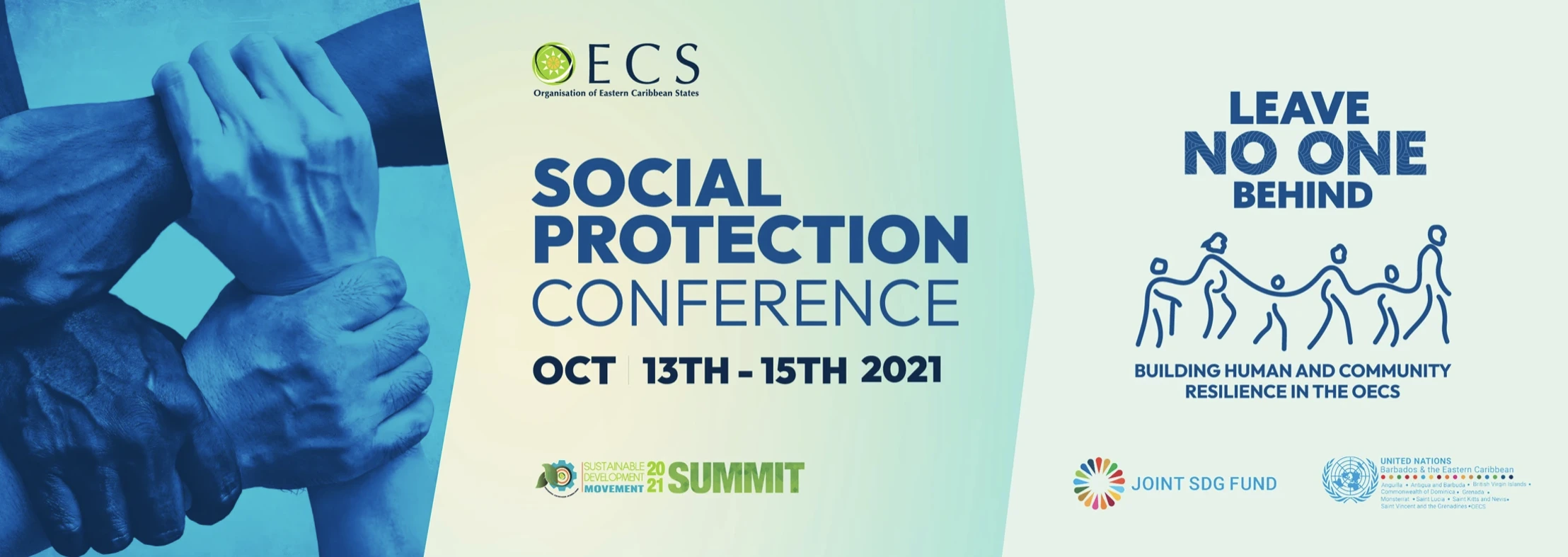OECS hosts successful 7th Council of Ministers Meeting for Human and Social Development

By Dr. Carlene RadixHead, Human and Social Cluster, Organisation of Eastern Caribbean States and
Tahira CarterSenior Communications Specialist, Organisation of Eastern Caribbean States
Monday, October 18, 2021 — The annual OECS Council of Ministers for Human and Social Development Meeting was held virtually from October 12-13, 2021 under the theme “Data and Dialogue for Direction: Using Information and Engaging People to Set the New Social Agenda in the COVID-19 Era.”
This year, the Council of Ministers Meeting was held as part of the wider Leave No One Behind Social Protection Conference, designed to increase awareness and dialogue around the development of shock-responsive social protection systems.
Social protection systems are designed to protect the most vulnerable in society and to ensure access to a basic level of needs for all. These systems have more to do in times of crisis, such as after disasters or economic shocks resulting from the COVID-19 pandemic, as many people lose their livelihoods and more people are in need.
Under the chairmanship of the Honourable Dee-Ann Kentish-Rogers, Minister of Social Development and Education for Anguilla, the Council of Ministers received presentations from Member States on COVID-19 responses.
It was clear that all presenting Member States, with the support of Development Partners, increased the number of persons receiving assistance and some increased the amount of assistance received by persons in response to COVID-19. At the same time, it was clear that Member States continue to have gaps in data and information around poverty, unemployment and beneficiaries.
The Council agreed to support, as feasible, requests for greater technical, financial and human resource support towards social protection data.
The Council also discussed the significant progress made in Child Justice Reform in the OECS and committed to ensuring relevant resources to continue this work. Changes in legislation mean that children across the OECS now have alternatives to prison and opportunities for rehabilitation when they get into conflict with the law.
A report was shared on Child Abuse data from 2017 to 2019 which showed that there continue to be reports of physical and sexual abuse and neglect of children, with higher rates amongst girls and children with disabiltiies. It was also noted that these numbers may be increasing under the strain of the COVID-19 pandemic. Further research will continue in this area.
A highlight of the meeting was a report from the Chair of the OECS Youth Advisory Network, Mr. Kamalie Mannix, who reported the ongoing engagement of youth across the region in the development of a youth strategy. Mannix highlighted current youth concerns including, unemployment and availability of opportunities to build relevant skills.
The Ministers of Social Development further:
- acknowledged the current strains related to the ongoing surge of COVID-19 including the increased responsibilities of the ministers and ministries as well as the impact on country capacity;
- acknowledged the tourism protocols from CARPHA, created in collaboration with the OECS, and the continued challenges of balancing tourism and COVID-19 protocols, including those for the cruise industry;
- agreed to support the collective approach to increase vaccinations among the population and relevant essential workers; and
- agreed to facilitate the psychosocial support of health and social service workers.
The Meeting also received presentations by Development Partners such as the International Labour Organization (ILO), the World Food Bank (WFB), the United States Agency for International Development (USAID), the Caribbean Development Bank (CBD), the United Nations Children’s Fund (UNICEF), and other relevant partners on the ways that they can and continue to support social protection in the region.
In her Keynote Address during the OECS Social Protection Conference, the Hon Minister Dee-Ann Kentish-Rogers noted that:
“We are reminded that we, as governments, have pledged to leave no one behind….the Sustainable Development targets and goals should be met for all nations, for all people and for all segments of society.”
The Council of Ministers Meeting provides the opportunity for Ministers to dialogue on significant policy and programme matters facing social development across OECS Member States and to collaborate in crafting common solutions to the issues that the sector faces.
About the Organisation of Eastern Caribbean States – OECS:
The Organisation of Eastern Caribbean States is an international organisation dedicated to economic harmonisation and integration, protection of human and legal rights, and the encouragement of good governance among independent and non-independent countries in the Eastern Caribbean comprising Antigua and Barbuda, Commonwealth of Dominica, Grenada, Montserrat, St. Kitts and Nevis, Saint Lucia, Saint Vincent and the Grenadines, British Virgin Islands, Anguilla, Martinique and Guadeloupe.





